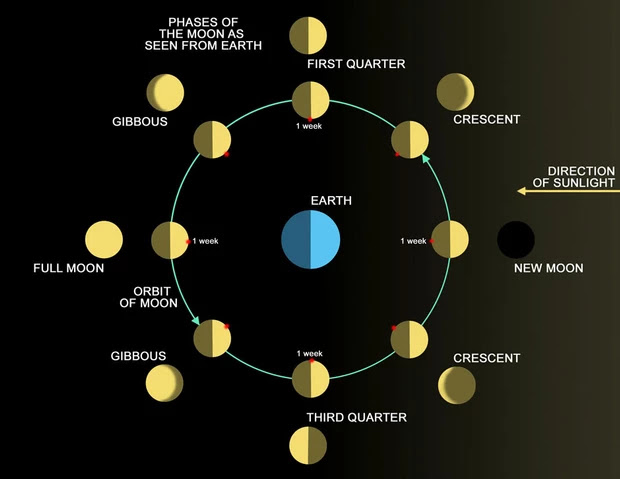The lunar cycle means that the full Moon tends to fall on slightly different dates from month to month.
There are 12 full Moons occurring during 2021:
Wolf Moon - 28th January
Snow Moon - 27th February
Worm Moon - 28th March
Pink Moon - 27th April
Flower Moon - 26th May
Strawberry Moon - 24th June
Buck Moon - 31st July
Sturgeon Moon - 30th August
Harvest Moon - 29th September
Hunter's Moon - 28th October
Beaver Moon - 27th November
Cold Moon - 27th December
The second full Moon of 2021 is the Snow Moon which can be seen from Saturday 27th February 2021 in the UK.
To be exact, the Moon will only be “full”, that is reflecting the maximum amount of sunlight on to the Earth, for just a moment. This happens when Earth comes exactly between the Moon and the Sun, a short period of time known as “syzygy”. This “syzygy” happens during UK daylight hours from 8.17am on 27th February 2021 but fortunately, to the naked eye, the Moon will still appear “full” for another 2 or 3 nights afterwards.
Why is it called a Snow Moon?
There is no firm agreement exactly where the Snow Moon got its name
from.
As Prof Bill Leatherbarrow, Director of the British Astronomical Association‘s Lunar Section says: “There is always uncertainty surrounding popular historical names for full Moons. The problem is that each month’s full Moon seems to have some kind of name attached to it, usually drawn from different cultures. It’s all relative and there is no scientific rationale or objective authority on which to base the names.”
However, it’s widely cited that the Snow Moon takes its name from the
snowfall common around this time of year in the northern hemisphere.
The Snow Moon is also dubbed the Full Hunger Moon across North America.
Many believe this originated with the fact that snowfall causes difficulties
for Native American hunters.
“Both of those cultural names for February’s full Moon makes sense
when you consider the climate. It is coldest in January and February, so they
are the months when snow is more common and wild food sources are hard to find.”
says Dr Das Baskill, Physics and Astronomy lecturer
at the University of Sussex.
Photo: Snow Moon over SS15 - Saturday 27th February 2021 at 7:45 p.m.


No comments:
Post a Comment
If you feel like commenting on my blog, you can contact me by completing the comment form below. I will respond to all comments and enquiries and constructive criticism will always be welcomed.